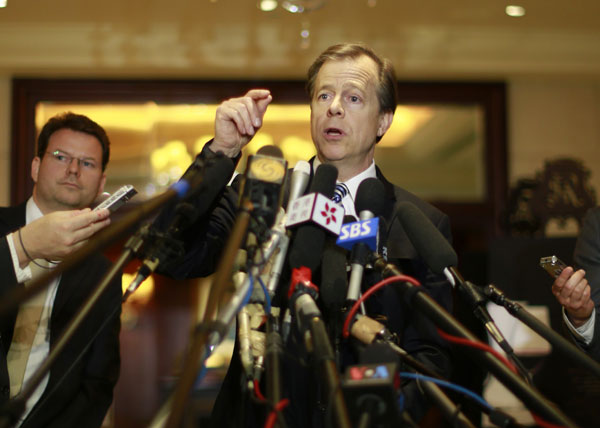US diplomat discusses DPRK
 0 Comment(s)
0 Comment(s) Print
Print E-mail China Daily, May 16, 2013
E-mail China Daily, May 16, 2013
 |
|
United States envoy for DPRK aff airs, Glyn Davies, talks to the media in Beijing on Wednesday. Davies exchanged views with Chinese offi cials on Korean Peninsula affairs. FENG YONGBIN / CHINA DAILY |
Concerned nations continued their diplomatic communications on Pyongyang's nuclear issue, as Glyn Davies, the US special representative for policy on the Democratic People's Republic of Korea, arrived in Beijing and exchanged views with Chinese officials on Wednesday.
Davies told reporters that he engaged in talks on the current situation, an evaluation of the situation and possible political measures on the issue with Chinese officials, including Wu Dawei, the special representative of the Chinese government on Korean Peninsula affairs, who recently visited Washington.
Arriving in Beijing after meeting his counterpart in Seoul on Tuesday, Davies also met with Vice-Minister of Foreign Affairs Zhang Yesui and Vice-Minister of the International Department of Communist Party of China Central Committee Liu Jieyi, calling that the talks "useful".
China and the US "shared the view that denuclearization on the peninsula is absolutely essential" if the two countries "are to move forward with any diplomatic process with North Korea", Davies said.
He added that China and the US "are seeking opportunities to achieve a greater level of cooperation and communication on the North Korean issue".
Davies' remarks indicate that Washington is paying more attention to political ways to tackle DPRK issues after US Secretary of State John Kerry visited East Asia in early April and showed Washington's willingness to communicate.
Davies' recent remarks and frequent communications on the DPRK issue show Washington is adjusting its Pyongyang policy by stressing military means and political talks at the same time, said Wang Junsheng, a researcher on Korean issues at the Chinese Academy of Social Sciences.
"Washington didn't pay enough attention to the DPRK issue in the first term of US President Barack Obama (from 2009 to January), and the old policy didn't stop Pyongyang's nuclear project, so Washington is trying new ways to tackle the issue", he said.
Wang said the frequent communications among countries involved on the nuclear issue with the DPRK have a positive effect on controlling the situation on the Korean Peninsula.






Go to Forum >>0 Comment(s)